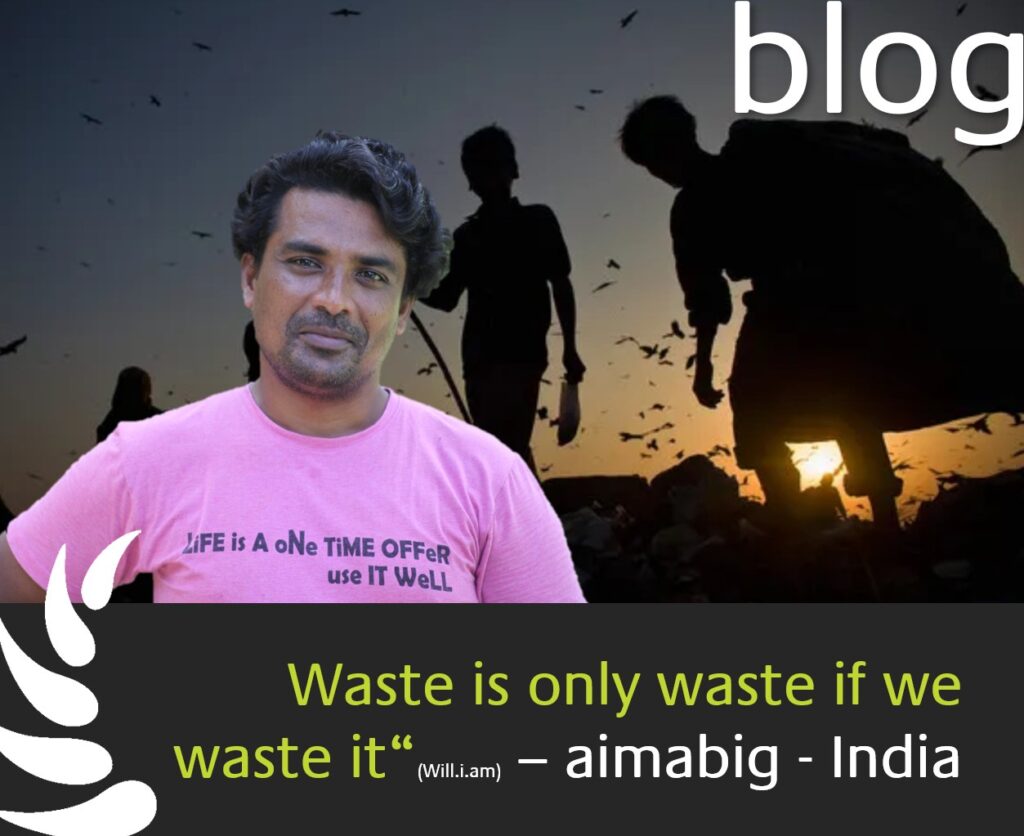Summary
In India, municipal waste management generally means that waste is dumped in open spaces. Yet, there are no clear demarcations in the dumping yard to categorize the storage place for different elements. However, waste could be sorted into the following sectors: degradable, non-degradable, organic, inorganic, industrial, medical, hazardous, and radioactive materials. But in dumping sites, everything is mixed. This causes environmentally harmful chemical processes and often such dumping sites catch fire.
The most affected people are the rag-pickers. Many of them work and live directly on the dumping sites, they don’t use protective gear, and are not aware of the health risks. Rag-pickers belong to the lowest ranks in society and don’t have alternative financial resources to work towards better or other employment.
Anbalagan is part of the community where the rag-pickers work, but he had never lived the life of one. Through field studies, he became dedicated to starting the organization ‘Aimabig’, in Tamil Nadu (Vellore District, an initiative that offers a model to formally employ rag-pickers. Formal employment means, that rag-pickers for the first time have benefits and health insurance. In addition to basic training and safety gear, they would continue to work with their new professional identity of being a member of Aimabig and a waste collection expert."
By Anbalagan Hari
What comes to your mind if you think of a rag-picker? Let me have a guess: A man, dirty, poorly clothed, roaming around to search for waste material in a pile of trash? Now, what’s the reality: most rag-pickers are not men, they are women or young children who are hard-working to feed their families.
I grew up in a small village in Tamil Nadu with less than a thousand inhabitants. It is close to Vellore and situated at the foot of a hill that has no greenery. My parents were daily wage workers, who despite their hard work found it difficult to make ends meet. Due to financial constraints, after finishing higher secondary school, I was forced to work in a leather factory with a salary of 750 Rupees per month (10 dollars). I had to cut sheep leather into small pieces to make gloves. The work was tough, my hands got calluses, I faced respiration issues, and my legs were strained by standing the whole day. This was just a regular day working at the leather factory when I was 16 years old.
The working conditions made us angry, and we started to willingly damage and waste parts of the leather. I still feel bad about this behavior. Because we should treat all resources that are valuable with care.
After two years of work, using my savings and employee benefits, I was able to return to college and finish my graduation. But again, a lack of funds stopped my post-graduate education. So, I re-joined working in the leather factory, but now as an HR assistant. Besides this work, in my free time, I did a master’s in public administration through distance learning. Here was where my passion for waste management started.
Later I did a field study about how employee behavior negatively impacts waste management. I contacted several leather companies to get their approval. The employers said that they liked it, yet they did not allow an outsider to speak with their employees. So, this was a dead end. Eventually, the only option was to shift the target audience. In 2018, I interviewed a student to verify the socioeconomic status of his family. Meeting him influenced me a lot. He lost his dad, and his mother did rag-picking to provide funds for her family. He was allowed to go to school, learned hard, got a scholarship, graduated, and got a job in the IT sector. His life significantly changed through this support, but his peers are still living a life on the margins of society continuing with rag-picking.
From all the stages in my life, I have been closely connected with the lives of rag-pickers. Yes, I am not one of them, but I had experienced all the circumstances of disadvantage and pain that they are facing in their life because I come from the same communal background. Even today, this particular community contributes to 99 percent of the workforce in cleaning the environment in both formal and informal sectors.
My initiative, Aimabig starts a model project at Vellore in Tamil Nadu, which opens the formal sector employment to rag-pickers. They may register as a member and then receive basic training to handle different kinds of waste using safety gear.
Additionally, they would go on to continue their work with the identity of Aimabig. Not just as a rag-picker, but instead as a waste collection expert or agent of Aimabig. Instead of collecting reusable/recyclable materials from dumping grounds, we would gather them from small piles of trash or directly from households, which would be much safer.
To ensure that rag-pickers receive already separated and safe waste materials, Aimabig regularly organizes workshops on the reduction of waste generation and how to optimize consumption (preventing waste to be generated in the first place). The workshops focus on community members and youngsters, particularly college students and volunteers. These two-days workshops are designed to create awareness and experiential training on waste management.
I cannot create a miracle changing the life of all of them. But I believe that waste, when managed properly is a resource that plays an important role to create a sustainable future.
Promoting new ways of waste management could offer livelihood opportunities for many. Therefore, I want to create dignified employment opportunities leading to a cleaner and more sustainable society.
Quote: “Waste is only waste if we waste it.” is from Will’i’am



